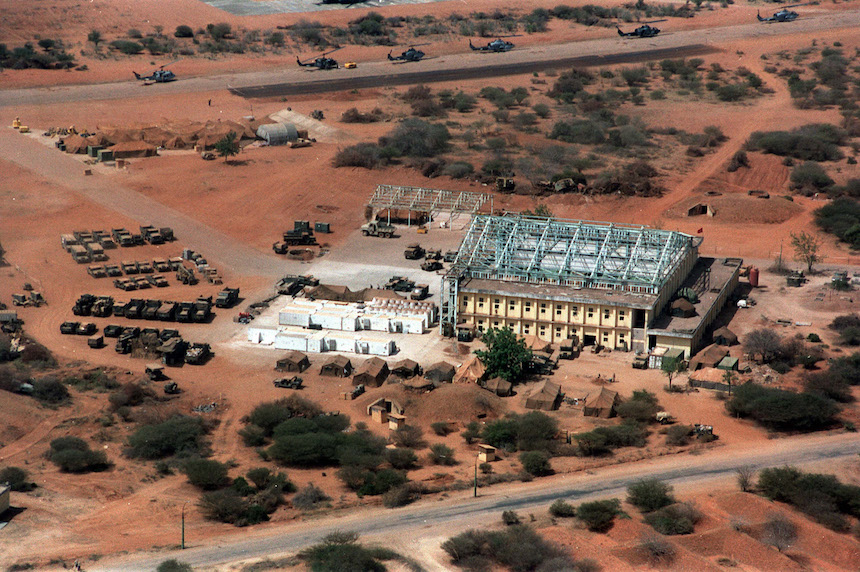
At Baledogle, an old Soviet airport seventy miles northwest of Mogadishu, Somalia’s capital, about thirty to forty U.S. operatives are managing an undercover drone operation. Somali commandos are also being trained at the base.
Early last month, it was used for launching a joint strike against al-Shabab, the Somali terror group. The joint strike was carried out by Somalia’s Danab commando team and a team of Navy SEALS, who were officially in an “advise and assist” role. The strike’s target was an al-Shabab’s radio station, Andalus Radio, which broadcasts Islamist propaganda. Navy SEAL Kyle Milliken was killed in the incident, becoming the first U.S. service member to die in Somalia since the deaths of nineteen U.S. Rangers and Delta Force special operators in 1993. Two other American soldiers were wounded.
The Trump administration regards the 4 May operation as an example of a renewed U.S. focus on the region aiming to create a more stable situation in which radical Islamist terrorism will it more difficult to operate.
Severe drought, which has been ravaging East Africa for years, is making securing Somalia more complicated, but the U.S. military believes it has strategic advantage in the region. Marine General Thomas Waldhauser, head of U.S. Africa Command (AFRICOM), said the famine is the biggest challenge for the new Somali president Mohamed Abdullahi Mohamed and his national government. “They have to do well in this,” he said. “‘cause if they can’t provide for this famine then Somalia, which has been without a national government for over 20 years, [the Somali people are] gonna question the purpose” of that new government.
Critics of U.S. strategy in Somalia, and in Africa more generally, express their concern that, in its campaign against radical Islamist groups like al-Shabab, Boko Haram, or Al Qaeda in the Islamic Maghreb (AQIM), the United States has relied too heavily on inexperienced or corruptible military partners. “You can watch in Mali and Somalia, the local militaries have swept through populated areas and cleared them,” says Katherine Zimmerman of the American Enterprise Institute, arguing that the United States has not paid enough attention to the methods used by the indigenous governments fighting terror. “For example, the methods that the Nigerian government used to fight Boko Haram stoked the insurgency,” she said. “We’ve convinced ourselves that working by and through a partner is going to solve the problem,” she told Fox News. “But in many cases, it’s making the problem we’re trying to solve worse.”
The administration’s senior members have been grappling with the issue of Somalia. Defense Secretary Jim Mattis and Under Secretary of State Thomas Shannon were in London on 11 May for a conference on how militarily and diplomatically resolve the Somali problem. The plan they worked out, according to Mattis, “includes on the security side both a continued maturation of their security forces in the defenses against al-Shabab, but it also includes a reconciliation program designed to pull the fence-sitters and the middle-of-the-roaders away from al-Shabab.”
“Our intent is to train and assist the African armies as much as possible, let them have the lead in fighting radical Islamist terrorists,” retired four-star Army Gen. Jack Keane said. He noted that President Trump, unlike former President Barack Obama, has given more authority to U.S. operational commanders to determine when to use force. Trump signed an order late March, valid until late September, allowing the U.S. military to conduct precision air strikes in a designated southern part of the country in support of partner forces.
According to Fox News investigation, however, the new military authority is rarely used, if at all, since the 4 May raid. According to experts, the new objective appears to be on gathering intel on al-Shabab and other groups before conducting new strikes. There are at least three drone bases in Africa – Djibouti, Cameroon, and Niger; and a rumored one in Tunisia, to help achieve this.
Comparing Trump and Obama administrations, Dan Gettinger of the Center for the Study of the Drone at Bard College, told Fox News that recent events show that pace of operations has increased and there are “more permissive rules of engagement for drone operations in Yemen and Somalia. Operations in West Africa do not appear to be affected by the change in administrations as yet.”
Mattis said the United States is “accelerating the tempo” in the war on terror.
It is too early to assess Trump’s Africa strategy, but the contours of the administration’s approach are beginning to emerge.
This article is published courtesy of Homeland Security News Wire.


